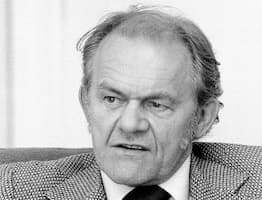The Remarkable Story of James Jones and ‘From Here to Eternity’
M.J. Moore shows how the writer’s trajectory toward greatness began with a woman named Lowney Handy and ended with the famous Scribner’s editor, Maxwell Perkins, known for his work with Hemingway and Fitzgerald.

‘Star-Crossed Lovers: James Jones, Lowney Handy, and the Birth of “From Here to Eternity”’
By M.J. Moore
Heliotrope Books, 278 pages
Lowney Handy did not hang out in Greenwich Village but in a small Illinois town. She didn’t wear a bra. She was not faithful to her unfaithful business executive husband. She had a penchant for picking young men who were aspiring writers.
Handy got away with her scandalous behavior because of her husband’s social prominence, and her willingness to play the role of supportive wife when he required her services at parties and public events. He obliged her by condoning her affairs and supporting her male protégés — chiefly, a wild kid named James Jones, whom no one took seriously when he said he planned to spend his life writing.
Jones had no money and joined the Army shortly before the Pearl Harbor attack. Wounded in action and aghast at the ruthless, hierarchical military that ground up individual initiative and rewarded the better educated elite who in turn looked out for one another, Jones went AWOL and should have been dishonorably discharged.
Instead, Handy wrote a series of canny letters on his behalf, fortunately reaching a sensitive, caring officer of the kind Jones had despaired of finding in the Army. She made a convincing case for Jones as a rough yet promising talent, whose release from the Armed Services would, in the end, profit the nation.
M.J. Moore tells the remarkable story about a budding writer whose first published novel, “From Here to Eternity,” won a National Book Award and changed what could be said in American literature by way of four-letter words and an all enveloping realism that out-Dreisered Dreiser.
Mr. Moore’s moving story never lets up, capturing Jones’s palpable ambition and explosive temperament, accentuated by alcoholic bouts and battles with Handy — who also never let up on her literary find, providing him with both the support and the severe criticism that did not allow him any time for self-indulgence.
Mr. Moore shows how Jones’s trajectory toward greatness began with Handy and ended with the famous Scribner’s editor, Maxwell Perkins, who rejected Jones’s first novel but gave him an advance for a second, which became “From Here to Eternity.” Perkins sensed that he had discovered a writer worthy to be in the company of F. Scott Fitzgerald and Ernest Hemingway, who made Perkins’s reputation as the publisher’s premier literary kingmaker.
The Perkins part of the story will astound writers today when they read about how Jones simply walked into Perkins’s office and, undeterred by the secretary, just stood there and would not leave until Perkins agreed to see him. Trade book editors today are elusive and an aspiring writer without an agent is a lost soul.
The bond between Perkins and Jones, as Mr. Moore deftly describes it, included criticisms that Handy had already prepared Jones to accept. Jones hardly bridled at all at Perkins’s demands. Even after Perkins died before publication of “From Here to Eternity,” Scribner’s editors followed through with unstinting support for Jones.
Mr. Moore does an equally good job of showing the impact of “From Here to Eternity” and how much bolder and more authentic the book was than novels such as “The Naked and the Dead,” as Norman Mailer himself acknowledged.
As fierce as Jones could be about preserving the profanity of his Army novel, he was strategic — giving in when dealing with Scribner’s lawyers but ultimately getting Charles Scribner’s approval of certain expletives because at that point, with the book already profiting from advance word on its boldness and high quality, there was no turning back.
Jones is shown as an extraordinarily generous man who funded Handy’s writers’ colony in gratitude for the years she and her husband supported him. But it all came to grief when she could not accept Jones’s young wife, Gloria, and came after Jones with a knife.
So the story ends badly, though Jones escaped physical harm, and Handy’s faith in him vindicated her, no matter their own fraught parting.
You won’t find a better story about literary apprenticeship and achievement than is found in “Star-Crossed Lovers.”
Mr. Rollyson is the author of “Nothing Ever Happens to the Brave: The Story of Martha Gellhorn” and “Norman Mailer: The Last Romantic.”

